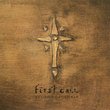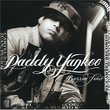| All Artists: John Philip Sousa, United States Marine Band Title: Sousa's Greatest Hits Members Wishing: 0 Total Copies: 0 Label: Altissimo Records Release Date: 9/7/1999 Genres: Jazz, Special Interest, Pop, Classical Styles: Swing Jazz, Marches Number of Discs: 1 SwapaCD Credits: 1 UPC: 754422556729 |
Search - John Philip Sousa, United States Marine Band :: Sousa's Greatest Hits
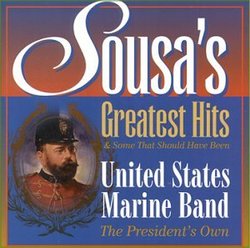 | John Philip Sousa, United States Marine Band Sousa's Greatest Hits Genres: Jazz, Special Interest, Pop, Classical
|
Larger Image |
CD DetailsSimilarly Requested CDs
|
CD ReviewsThe Best, by The Best Daniel E. Turkington | Danville, VA USA | 01/28/2003 (5 out of 5 stars) "If you've never owned an album of marches, or even if you have many others, this would be a great one to get, since it has the "March King's" all time favorites, plus some you probably haven't heard, played by the band he made famous (in addition, he led the most famous civilian band of all time, Sousa's Band, of course). The playing is superb throughout, as befits the U. S. Marine Band, the "President's Own" (Sousa served as director under five of them). Some notes on the marches: 1. Stars and Stripes Forever (1896) - Sousa would have made his place in musical history if he had written nothing but this piece of music, our "National March". 2. The Bride Elect (1897) - From the operetta of the same name. Mostly taken from "Unchain the Dogs of War", the song which ends act II. One of Sousa's personal favorites among his marches. 3. Semper Fidelis (1893) - From the Latin, meaning "Always Faithful", this is the official march of the U. S. Marine Corps. 4. King Cotton (1895) - Written for the Cotton States and International Exposition, this is one of the few marches written for fairs and expositions to become popular. 5. Sound Off (1885) - The title is based on the verbal marching command, and is one of his most "militaristic" marches. 6. The Washington Post (1889) - Perhaps Sousa's most popular after "Stars & Stripes", it was sold for the small sum of $35. It was one of the most favorite pieces of music to dance to in the 1890's, to the two-step. 7. The Gladiator (1886) - Sousa's first "march hit". Dedicated to a Boston journalist. Why the title was chosen is not known. 8. National Fencibles (1888) - Dedicated to a Washington, D. C. drill team. 9. Jack Tar (1903) - Dedicated to the British Navy. First performed in front of British royalty, along with other bands from around the British Empire. Perhaps his most "nautical" march. 10. The Thunderer (1889) - Dedicated to "Columbia Commandery No. 2, Knights Templar, of Washington, D. C.", an order of freemasons, to which Sousa belonged. Possibly the most famous "street" march ever written. 11. Sabre and Spurs (1918) - Dedicated to the 311th Cavalry of the U. S. Army. One of several military marches he wrote during World War I. 12. The Royal Welch Fusiliers (1930) - Written to honor the 30th anniversary of the association of American Marines with the Royal Welch Fusiliers during the Boxer Rebellion of 1900 in China. Sousa originally wrote a version of this march titled "The Welch Fusilier March", which included several well-known melodies in the trio, but was asked to revise it to include only original themes. 13. El Capitan (1896) - Contains several themes from his most popular operetta. It was the march that Sousa used for one of the only times Sousa's Band actually marched in a parade, in this case the victory parade in 1899, after the Spanish-American War, in New York City. 14. The Gridiron Club (1926) - Despite the title, the "Gridiron Club" is a group of journalists in the Washington, D. C. area. Sousa was the first of many Marine Band leaders to serve as its musical director. 15. Manhattan Beach (1893) - Named for the waterfront summer resort where Sousa's Band frequently played. 16. The Man Behind the Gun (1889) - Another march incorporating themes from one of his operretas. 17. The Invincible Eagle (1901) - Written for the Pan American Exposition in Buffalo, New York. 18. The Gallant Seventh (1922) - Written for the 7th Regiment, 107th Infantry of the New York National Guard. Of course, Sousa wrote many other brilliant marches, and a good way to listen to many of them would be to acquire Frederick Fennell's recordings of the Eastman Wind Ensemble, such as Sound Off and Sousa on Review." Sousa, as only The US Marine Band Can Play Roger Kennedy | 03/18/2002 (5 out of 5 stars) "This is a superlative collection of Sousa marches. There are many CDs of Sousa out there, but few can match the quality of the US Marine Band. Afterall, this was the band that Sousa lead in person for 12 years from 1880 - 1892. He transformed the Marine Band from an average music ensemble, to one of the premier bands in the United States today. Many of the marches presented in this collection were written by Sousa when he was director of the band during those years. Sousa left his mark on the Marine Band for sure, as the band has a stength and drive when playing these marches unlike any other. In addition to the many standards offered here, there are several less heard selections of Sousa's marches. Sousa wrote 136 marches in his day, and sadly few of them are performed today. We tend to hear the top 10 or 15 mostly, which is unfortunate. The listener will find many of those popular marches here, but a sampling of lesser known marches is here as well. In particlar the march "Royal Welch Fusilers" which was the only march Sousa ever wrote for a British regiment. The Royal Welch had fought with the 2nd Marines in 1900 at Peiking,China and in recognition of this event the Marine corps asked Sousa to compose a march. Sousa subsequently traveled to England to conduct in person the regimental band of the 2nd battalion, the Royal Welch Fusiliers. This march was one of the last the famed March King wrote before his death in 1932. The music of JP Sousa was typical of its time and reflects a bygone era in America. A good selection of these classic marches are found here on this great CD by Altissimo! records. Don't pass it up!" A Great Sousa Collection John McCutcheon | MI | 12/14/2004 (5 out of 5 stars) "These recordings seem to date from the 1960s and reflect a style of play that is impossible to find today. Some people might consider the sound to be too bright, the entrances too aggressive. But I think this is more authentic for Sousa than what one generally hears today. Sousa himself is known to have preferred "enthusiastic" entrances from his players, to have favored an "orchestral" sonority for his band and to have played his marches in strict tempo with no ritards or tempo changes. That is what you have on this disc, which features the Marine Band under Lt. Col. Albert Schoepper, who also conducts on Volume 3 of Altissimo's Sousa Original series."
|

 Track Listings (18) - Disc #1
Track Listings (18) - Disc #1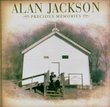
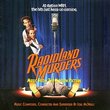
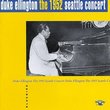

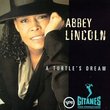
![Harry Potter and the Prisoner of Azkaban [Original Motion Picture Soundtrack]](https://nationalbookswap.com/cd//m/28/9428/689428.jpg)
